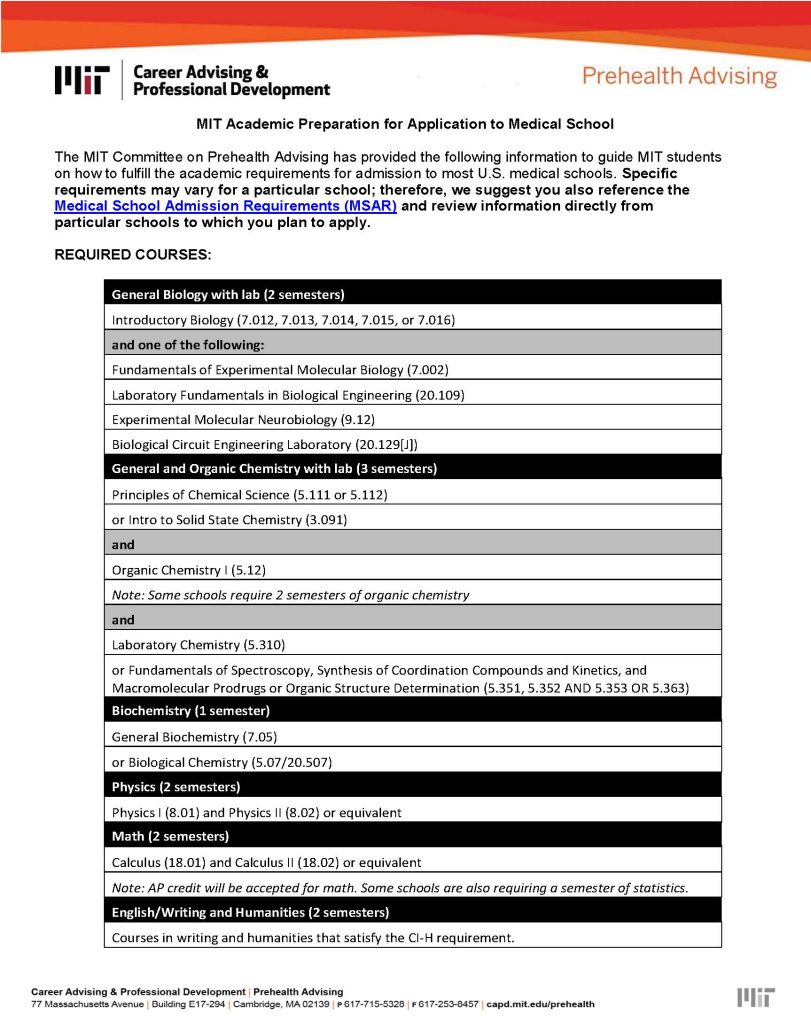Courses, Requirements, and Grades
Each medical school requires applicants to satisfy a set of courses and competencies in order to gain admission. Applicants have up until they matriculate to medical school to complete each of these requirements. We recommend applicants take their required courses at MIT, but if you can’t, you can take courses at another university or post-baccalaureate and special master’s programs.
While prehealth coursework requirements can vary from school to school, medical and health profession schools in general require applicants to complete the following courses below.
- General Biology w/ Lab (2 semesters), General Chemistry w/ Lab (2 semesters), Organic Chemistry I (1 semester), Biochemistry (1 semester), Math (2 semesters, statistics recommended), Physics (2 semesters), English/Writing & Humanities (2 semesters)
These requirements can vary from school to school, so we recommended applicants do their research to ensure you are aware of each schools’ unique set of requirements. A sample list like this can help you organize this information.
Required Prehealth Courses at MIT
MIT students can fulfill the courses and competences required by medical and health profession schools is by completing the required courses listed on the guide below.

Course Structure at MIT
The benefit of attending MIT and being premed is that 9 of the 12 required courses for medical and health profession schools are also General Institute Requirements (GIRs). The 9 classes that are GIRs are shown on this guide.
Also, the lecture and lab portion of classes at MIT are taught separately. This separate lecture and lab structure provides more time to cover the same material covered in two semesters in a condensed format. *The one exception to this separate lecture and lab structure is Physics I (8.01) and Physics II (8.02).
Recommended Courses
In addition to the required courses above, individual medical and health profession schools also encourage applicants to take additional courses. We strongly advise you check the admissions requirements for each school you apply to so you are aware of any additional courses they recommend. Visit the schools’ websites to find this information or use the Medical School Admissions Requirement (MSAR) book.
Recommended courses for all Prehealth students:
- Statistics – in addition to Calculus, many medical and health profession schools encourage applicants to also take a statistics course. At MIT, Introduction to Probability and Statistics (18.05), Statistics for Brain and Cognitive Science (9.07), and Modern Biostatistics (7.093) are the common statistics courses taken by prehealth students though there are other options available on campus.
Recommended courses for MD-PhD applicants:
- Differential Equations – 18.03
Grade Point Averages (GPA)
Medical and health profession schools accept a wide range of GPAs but it is generally recommended to have a 4.5 gpa or higher on a 5.0 scale. Medical schools prioritize two of your grade point averages. Classes that make up your Biology, Chemistry, Physics, and Math GPA (BCPM) will be the primary gpa that is given the most weight, with your Cumulative GPA being secondary.
For 2021, the BCPM GPA for accepted MIT applicants was 4.71/5.0 and Cumulative GPA was 4.74/5.0. The range of accepted GPAs was ~3.9 – 5.0. The acceptance rate for MIT’s 2021 cohort was 74% for MD applicants and 90% for MD-PhD applicants.
If your GPA is not a 5.0, remember that medical and health profession schools use a holistic admissions process and take into account a variety of other factors in your application (e.g. volunteer & clinical experiences, recommendations, MCAT scores, GPA trend, leadership, etc.)
To maintain a strong GPA, we recommend managing your time well! Avoid taking an unmanageable course load, balance your involvement in research, extracurricular, and social activities, and seek out support from your TA’s, faculty, and peers when needed. If you are concerned about your grades, talk with Prehealth Advising, your academic advisors, or seek out academic support from Tutoring@MIT.
Resources on Required Courses & Calculating Your GPA
MIT Prehealth Recommended Course List and FAQs
The MIT prehealth recommended course list is based on feedback from medical schools and MIT faculty. It includes FAQs about course work and the MCAT.
MIT Prehealth Course Planning Guide
The MIT Prehealth Course Planning Guide highlights 3 common paths for completing prehealth required courses at MIT. This guide can assist first-year students in deciding when to take certain required courses. If you have any questions, please email prehealth@mit.edu or speak with your academic advisor.
MIT Courses That Prepare You for the MCAT – MIT Prehealth Advising
The courses listed that are marked with a check will prepare you for the MCAT. Applicants are generally prepared to take the MCAT after the end of their sophomore year.
Medical School Admission Requirements (MSAR)
The MSAR has information about each school’s specific requirements, as well as application procedures and deadlines and selection factors such as MCAT and GPA.
AAMC Member Medical School Directory
The Medical School Directory has information on the U.S. and Canadian AAMC-member medical schools.


